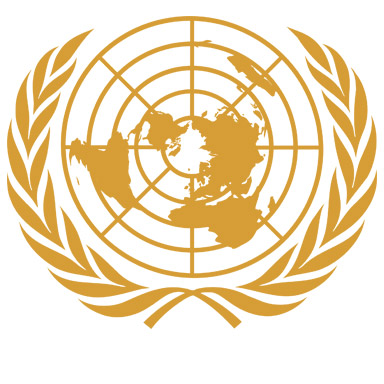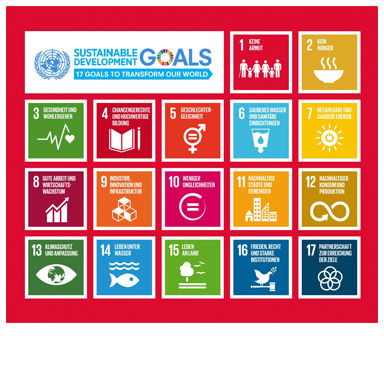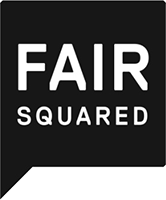

What is the story behind the 17 goals for sustainable development and what does FAIR SQUARED have to do with it?
Within the community of states 193 UN states adopted the agenda 2030 for sustainable development in September 2015. In this context the Sustainable Development Goals (SDGs) were formulated. The plan: They should influence politics in the next 15 years significantly regarding the topics of development and sustainable policies.
But did you know that the Fair Trade movement and fair trade as we practice it are already following many principals and claims of the agreed UN sustainability goals for a long time?
These SDGs are part of the Agenda 2030
This illustration summarises all 17 SDGs which basically describe the five key messages – human, planet, wealth, peace and partnership – in more detail.

Fair trade already follows many SDGs
Since the foundation of FAIR SQUARED, we are following the approach of helping all people who are involved in the production process to improve their life and working conditions. That is because we are convinced that a sustainable future is only possible by involving fellow humans and the planet into the process as far as possible.
1. No poverty
We are paying a fixed price for raw materials plus a premium which is used to increase the financial conditions of our partners and to invest into sustainable projects.
2. No hunger
In order to establish a stable livelihood for all farmers and producers of our raw materials, we are paying a price that is defined independently of the global market price. This is how it is guaranteed that the livelihood is secured even though the global market price drops.
3. Health and well-being
People who are living in the global south often suffer from harmful living conditions. This includes bad working conditions, missing sanitary and medical facilities as well as frequent usage of chemicals in land cultivation. But the Fairtrade standards involve numerous specifications that protect the health of workers. Therefore, dangerous pesticides are prohibited, the compliance with break times is obligatory, and much more.
4. High-quality education
In the context of Fairtrade projects, the infrastructure is supported through Fairtrade premiums in the form of schools, educational material, or further trainings.
5. Gender equality
We and the participants of fair trade are committed to achieve equality and independence of genders in the global south. Therefore, woman working rights are systematically promoted so that they can equally participate in the agricultural sector in order to increase their own future opportunities.
6. Clean water and sanitations
There are committees elected by the workers that decide about the investment of the premiums. This is how e. g. fountain projects are realised, which ensures the access to clean drinking water.
7. Affordable and clean energy
Almost as important as the access to clean drinking water, is the extensive supply of affordable energy sources. That is because development without energy is not possible. To build and extend the efficient energy supply systems is a great challenge for the community of states. Considering the climate change, it is necessary that the supply of energy is clean and environmentally friendly in the future. Here in Cologne in our offices and manufacture, we are using green energy with conviction from sustainable power supplies of Greenpeace Energy.
8. Humane working conditions and economic growth
A sustainable economic growth may only occur under fair conditions. Therefore, ideals like the prohibition of child and forced labour, as well as the living wages are essential for fair trade.
9. Industry, innovation, and infrastructure
In addition to our Fairtrade cooperation, we as a sustainable company are interested in exploring new environmentally friendly pathways. Hence, we are trying to include regional available materials, local partners and innovative technology into our daily work processes.
10. Less inequality
Fairness plays an important role in our whole supply chain and company structure. Flat hierarchies, a right to say for all employees as well as respect for the needs of all are taken for granted at FAIR SQUARED.
11. Sustainable cities and communities
As Fairtrade partner we are proponents of the initiative of Fairtrade towns. And support the extension of the campaign for further communities. Cologne, where our office is located, can call itself “63rd Fairtrade-Town” since November 2011.
12. Sustainable consumption and production
Obviously, we as producer and trader are striving to sell our products. But this cannot happen at the expense of the environment. This is why we are compensating all our emissions by climate protection projects, changing our assortment to completely plastic-free and engaging in the development industry-specific solutions.
13. Measures for the environmental protection
We promote the sustainable and resource-friendly cultivation of raw materials under fair trade conditions. Furthermore, we support the ecological cultivation and take the opportunity to make climate and environmentally friendly products more attractive to customers as an alternative to conventional products.
14. Life under water
Our responsibility is not limited to the life on land. Especially the marine ecosystem is threatened by our lifestyle. With our partners in Sri Lanka we initiated a little Ocean Plastic Project. We found a way to recycle PP bottle lids which means that they won’t end up in the ocean.
15. Life on land
Only an intact ecosystem can satisfy the needs of humans and animals in the future. That is why we are using FSC® certified raw materials and stand up for sustainable and fair conditions in the cultivation of latex in India and Sri Lanka.
16. Peace, fairness, and strong institutions
We strengthen the rights of people in the global south through fair trade and give them the opportunity to be part of the global trade. This establishes emancipation and contributes to an acceptable solution in global trade relations.
17. Relationships to achieve goals
We meet our fair trade business partners all around the world on eyelevel. Moreover, we exchange information with various fair trade organisations and other institutions who help us achieving the global sustainable goals.
19. September 2019
